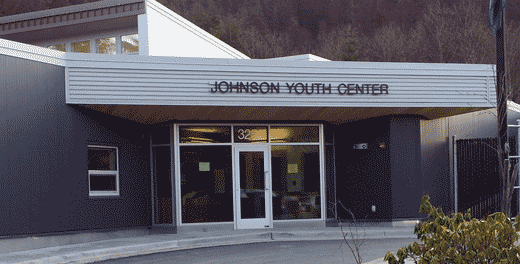Johnson Youth Center

Johnson Youth Center is a 23-bed youth facility in Juneau. It provides space for 8 juveniles on short-term detention and 15 on long-term treatment.
JYC Combined Units
As with many organizations in recent months, the Johnson Youth Center (JYC) has experienced unprecedented staff shortages. To promote the safety and security of youth and officers, the facility has combined the Detention and Treatment Units. The combination is necessary to maintain the staff-to-youth ratio per Alaska Statutes and Performance-based-Standards (PbS). DJJ reduced the treatment capacity from 15 to 10 youth, and the detention capacity remains unchanged at eight youth. The classes and groups remain separate despite the detention and treatment youth sharing a space.
The division currently prioritizes recruitment and retention and hopes to safely separate treatment and detention as soon as possible.
JYC Detention
The Detention unit at JYC was built in the 1960s and was long insufficient to meet the security and programming needs of modern juvenile justice practices. The Legislature approved funding for a new Detention unit and construction began in 2010. The unit was finished in February of 2013 and opened its doors for use in March. The construction included a renovation of the Juvenile Probation offices as well. The Detention unit allows more direct supervision of youth while providing an environment conducive to programming.
JYC staff operates on a strengths-based approach, leveraging the things that youth are good at to help work around things they find more challenging. Staff members build strong relationships with the youth we serve and use these relationships to deliver skills through groups such as anger management, drug and alcohol education, and life skills.
JYC Treatment
The Girl’s Treatment Unit (GTU) of the Johnson Youth Center is a secure, 12-bed facility. The average stay for a resident entering the program ranges from 12 to 18 months. The purpose of the unit is to provide a safe, secure, and gender-specific therapeutic environment for institutionalized female residents. GTU implements the Trauma Informed Effective Reinforcement System (TIERS), a gender-responsive, research-based model. TIERS offers effective behavior management systems that reinforce positive, safe behaviors by applying innovative relational, trauma-informed, and strengths-based practices.
During treatment, we work with residents on their individual treatment needs while maintaining the focus of the Division of Juvenile Justice’s Mission. Trained staff administer various assessments and screenings which outline what the youth need to lead a successful and crime-free life.
In addition to their individualized programs, DJJ requires residents to complete core groups: Aggression Replacement Training (ART), Prime for Life (substance abuse education), and Acceptance Commitment Dialect -- which is a 16-session cognitive group to encourage the concepts of values, goals, and behavioral accordance with one’s objectives. These groups are essential in fostering pro-social skills that will allow them to be productive members of society once they reenter the community.
After completing these core groups, residents often build enough trust and gain the privileges of supervised community contact and increased autonomy.
The treatment team and transition case workers design and implement a 90-day transition plan, including post-secondary education, job placement, and independent living housing. Once youth successfully complete their transition plan, the State releases them from custody.